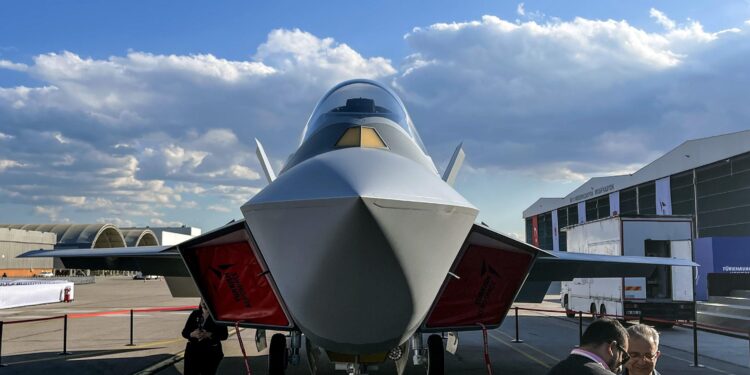TĂŒrkiye has reaffirmed its commitment to developing a domestically powered fighter jet, emphasizing that the aircraft will not rely on any single foreign engine supplier. The announcement comes amid growing efforts to bolster national defense capabilities and reduce dependence on external military technology. According to officials, the move aims to enhance strategic autonomy and address vulnerabilities exposed by past restrictions on defense exports. As TĂŒrkiye advances its indigenous aviation projects, the insistence on diverse engine options signals a significant step toward self-reliance in its defense industry.
TĂŒrkiye Asserts Strategic Independence with Domestic Fighter Jet Engine Development
TĂŒrkiye has taken a decisive step towards bolstering its defense autonomy by advancing the development of a homegrown fighter jet engine. This initiative marks a critical shift from reliance on established foreign suppliers, emphasizing the country’s ambition to control the entire lifecycle of its next-generation combat aircraft. Government officials have openly stressed that the new engine will enhance national security by ensuring operational independence and eliminating vulnerabilities tied to international geopolitical dynamics.
The project highlights several strategic advantages, including:
- Uninterrupted supply chain: Reducing risks linked to sanctions or export restrictions.
- Customized performance: Tailoring engine specifications specifically to TĂŒrkiye’s defense needs.
- Economic growth: Stimulating local technology sectors and creating high-skilled jobs.
| Feature | Foreign Engines | Domestic Engine |
|---|---|---|
| Supply Stability | Susceptible to sanctions | Fully controlled |
| Customization | Limited | High |
| Economic Impact | Minimal local benefit | Job creation + tech growth |
Challenges and Innovations in Reducing Reliance on Foreign Aerospace Technology
TĂŒrkiye faces a multifaceted challenge in developing indigenous aerospace technology that can rival foreign counterparts, especially when it comes to high-performance fighter jet engines. The complexity lies not only in mastering advanced materials and precision manufacturing but also in integrating cutting-edge avionics and propulsion systems. To break the dependency on a single foreign engine supplier, Turkish engineers are exploring modular designs that allow for multiple engine options, reducing risks associated with geopolitical tensions and supply chain disruptions. This strategic diversification demands significant investment in research and development, as well as the cultivation of specialized talent skilled in aero-engine technologies.
Innovations emerging from this endeavor emphasize collaboration between governmental agencies, defense contractors, and academic institutions. Key focus areas include:
- Advanced Composite Materials to improve engine efficiency and durability.
- Digital Twin Technologies for real-time simulation and testing.
- Adaptive Engine Control Systems that optimize performance across varying flight conditions.
The table below highlights the core components where TĂŒrkiye is prioritizing innovation to ensure autonomy in its fighter jet development:
| Component | Current Status | Target Capability |
|---|---|---|
| Engine Core | Prototype Testing | Full Domestic Production |
| Avionics Suite | Joint Development | Indigenous Design |
| Propulsion System | Imported Components | Multi-Source Flexibility |
| Materials Engineering | International Collaboration | Self-Sufficient Manufacturing |
Policy Recommendations to Strengthen TĂŒrkiye’s Defense Industry Autonomy
To ensure sustainable growth and true independence within the defense sector, TĂŒrkiye must prioritize investment in domestic research and development (R&D), fostering innovation that reduces reliance on foreign technologies. Strengthening collaborations between universities, government agencies, and private aerospace companies can accelerate breakthroughs in engine design and manufacturing processes. Additionally, establishing dedicated funds aimed at nurturing small and medium enterprises (SMEs) specialized in high-tech defense components will diversify supply chains and mitigate risks associated with external dependencies.
Moreover, TĂŒrkiye should implement a robust framework for technology transfer agreements that safeguard intellectual property while enhancing local expertise. Encouraging transparency in procurement and focusing on multi-source partnerships will prevent overreliance on any single foreign entity. The following table outlines key focus areas to solidify this autonomy:
| Focus Area | Action Steps | Expected Outcome |
|---|---|---|
| R&D Funding | Increase budget allocation by 30% | Accelerated engine technology innovation |
| Talent Development | Launch specialized aerospace engineering programs | Skilled workforce for defense industry |
| Supply Chain Diversity | Incentivize SME participation | Resilient and varied component sources |
| Technology Transfers | Negotiate balanced IP agreements | Enhanced domestic expertise and production |
Concluding Remarks
As TĂŒrkiye advances its ambitions for a self-reliant defense industry, the commitment to developing fighter jets free from dependence on any single foreign engine underscores the country’s strategic emphasis on sovereignty and technological independence. This approach not only aims to strengthen national security but also positions TĂŒrkiye as a key player in the global aerospace sector, navigating the complex geopolitics of defense manufacturing with greater autonomy.
















